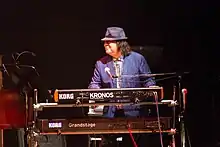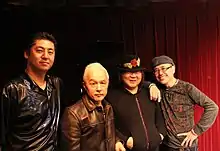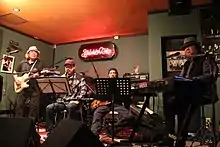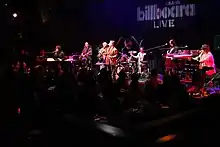Mickie Yoshino
Mickie Yoshino[15] (born 13 December 1951) is a Japanese keyboard player, composer, producer, and arranger. Yoshino is known for leading the rock band Godiego. In 2005, he won a Japan Academy Prize for his music. Yoshino's compositions were used in the film Swing Girls (Altamira Pictures). Yoshino still produces music with groups such as Godiego and EnTRANS.
Mickie Yoshino | |
|---|---|
 | |
| Born | Mitsuyoshi Yoshino 13 December 1951 Yokohama, Kanagawa prefecture, Japan |
| Nationality | Japanese |
| Occupation | Musician, songwriter, composer, arranger, producer |
| Years active | 1968–present |
| Musical career | |
| Genres | |
| Instruments | Keyboards, vocal |
| Labels | Toshiba EMI,[1] Nippon Columbia,[2] Satril Records,[3] BBC Records,[4] Universal Music Japan,[5] G-matics,[6][7] Bandai Music Entertainment,[8] Omagatoki,[9][10] A.La.Mode Co., Ltd.,[11][12] Pioneer,[13] Pony Canyon[14] |
| Associated acts | The Golden Cups, Sunrise, Flesh & Blood, Dutch Baker, Mickie Yoshino Group, Godiego, P.S.M. All Stars, EnTRANS, Natsuno-Gumi, |
| Website | www |
Biography
Early years and The Golden Cups
Yoshino's musical career began when he was a junior in high school, playing in night clubs and the U.S. military base in Yokohama, Japan. In 1967, at the age of 16, he became a member of The Golden Cups, a pioneering Japanese blues band that released several popular hits.[16] After leaving the band in 1971,[17] he studied music at the Berklee College of Music in Boston.[18] While there, he studied piano with Charlie Banacos, Dean Earl, Ray Santisi, and Edward C.Bedner. He also performed arrangements with Gary Burton and Phil Wilson. Yoshino formed the group Flesh & Blood (a.k.a. "Dutch Baker") and played in the Boston rock scene at the same time as Aerosmith and Boston.[19][20]
Godiego
After graduating from Berklee, Yoshino returned to Japan to form the group Godiego (pronounced Go-Dai-Go).
Godiego appeared frequently on the hit charts from 1978 through the mid-1980s[21] and is credited with influencing the Japanese pop scene.
In the United Kingdom, Godiego became known for the theme song of the BBC TV series The Water Margin. The song reached number 16 on the UK singles chart.[22] Satril Records released the album The Water Margin in the UK and Europe.[23][24] Godiego's biggest hits in Japan came from a TV series called Monkey, which also aired on the BBC. This series became a "cult Japanese TV series" with videos and DVDs sold not only in the UK but in Australia, New Zealand, South Africa and other countries. "Gandhara" and "Monkey Magic" were the most well-known songs from the TV series. Godiego also attracted international attention when they wrote and released "Beautiful Name", the theme song for Unicef's International Year of the Child.
Yoshino also wrote and played for soundtracks such as the film House.[25] Francis Ford Coppola intended to select Japanese composer Isao Tomita for his movie Apocalypse Now, but this was prevented due to a label contracts issue,[26][27] and Tomita[28] had been planning to let Godiego record the rock part of the soundtrack.[29]
Yoshino was also very involved with Roland Corp. in the development of synthesizers and digital stage pianos in the 1970s and 1980s.[30] Godiego was one of the first rock bands to use a guitar synthesizer for both recordings and live performances.[31]
In 1980, Godiego was the first rock group to perform in China.[32][33][34] They also performed for 60,000 people in Katmandu, Nepal,[35] and performed in Australia[36] and the United States.[37] Around 1985, Godiego broke up. In 1999/2000, they reunited for a 17-concert nationwide tour.
1980s–1990s
In the late 1980s, Yoshino helped to establish the PAN School of Music in Tokyo and Yokohama. He also released his own albums American Road and Longway from Home, and worked with many musicians including Paul Jackson,[38] Jennifer Batten,[39] Peter Green and Ray Parker, Jr.,[40] Kenichi Hagiwara,[41] and Shuichi Hidano.
EnTRANS and jazz/fusion activities

Yoshino has participated in diverse musical activities since the 1960s. He joined the Time is Now jazz and rock crossover concert[42] with the Terumasa Hino Quintet, Hiroshi Kamayatsu, and Takayuki Inoue in 1969. With Godiego, Yukihide Takekawa and he composed "Suite: Peace" inspired by the theme of Edward Elgar's Pomp & Circumstance No.1 in 1977, and "In You Kanjincho" based upon Nagauta, Japanese traditional music, and Kanjincho. Yoshino arranged a rock tune with horns and traditional Japanese musical instruments such as the shamisen, shakuhachi, biwa and tsuzumi in 1981.
He formed a crossover musical group called EnTRANS with Takayuki Inoue, Yoshihiro Naruse (Casiopea 3rd), Nobuo Yagi (blues harp) and Shuichi Hidano (Taiko drums). Inonu retired in 2009, but the band continues to perform. Since the 2000s, Yoshino has frequently played with the jazz musicians Kenji Hino and Masa Kohama.
The Golden Cups reunion

In the early 2000s, Yoshino participated in the reunion of the Golden Cups and a documentary film, The Golden Cups One More Time,[43] which was produced by Altamira Pictures. The movie showed the band's influence on many Japanese rock players,[44][45] such as Kiyoshiro Imawano, Akiko Yano, Takayuki Inoue, and Ken Yokoyama.
Go-Die-Go's Endless Journey

Yoshino reformed Godiego in 2006 with the popular members Yukihide Takekawa, Takami Asano, Steve Fox, and Tommy Snyder. They had a three-year series of concerts for Tokyo Metropolitan Art Space, 2007–2009. In 2014, Yoji Yoshizawa joined the band, and they continue to tour, releasing CDs and DVDs.
Bands[46][47]
- Saburos[48] (1965)
- J.Walker & Pedestrians[49] (1965)
- Shuson Konno & New Camelias[50] (1966)
- Chosen Few[51] (1966)
- Midnight Express Blues Band[52] (196–1967)
- BeBes[53] (1967)
- Flower Creation[54] (1968)
- The Golden Cups (1968–1970, 2004–)
- Mickie Yoshino Group Mark I[55] (1970)
- Sunrise[56] (1970–1971)
- Funky Tongue (1971)
- Rapscallion[57] (1972)
- Flesh & Blood[58] (1972–1973)
- Dutch Baker Band[59](1973–1974)
- Mickie Yoshino Group Mark II[60] (1974)
- Mickie Yoshino Group Mark III[61] (1974)
- Mickie Yoshino Group Mark IV[62] (1975)
- Mickie Yoshino Group Mark V[63] (1975)
- Godiego (1976–1985,1999–2001, 2006–)
- Mickie Yoshino Group Mark VI[64] (1976)
- Mickie Yoshino Group Mark VII[65] (1977–1978)
- Kaleidoscope Session Band Rock Session[66] (1977)
- Kaleidoscope Session Band Jazz Session[67] (1977)
- PAN[68] (1983–1986)
- Debut![69] (1983–1986)
- Andre Marlrau Band[70] (1985–1990)
- Black, Yellow & White[71] (1986)
- P.S.M. All Stars[72] (1987–1988)
- Paul Jackson Band[73] (1987–1988)
- Mickie Yoshino Special Band[74] (1987–1988)
- Mickie Yoshino & SLYME[75] (1987–1988)
- Mickie Yoshino Band[76] (1992)
- Earthmatics[77] (1994)
- Valco[78] (1995)
- Joe Yamanaka Band (2000–2006)
- EnTRANS[79] (2001–)
- Silver Cups (a.k.a., Yokohama Super Session Band)[80] (2010–)
- Natsuno-Gumi[81] (2010–)
- Mickie Yoshino New Group[82] (2010–2011)
Discography
Studio albums
- The Golden Cups Album Vol. 2 (1968)
- Blues Message The Golden Cups Album Vol. 3 (1969)
- The Fifth Generation (1971)
Live albums
- Super Live Session (1969)
- The Golden Cups Recital (1969)
- One More Time (2014)
Singles
Compilations
- The Best of The Golden Cups (ザ・ゴールデン・カップスのすべて; 1969)
- Girl With Long Hair - The Best of The Golden Cups (長い髪の少女 ザ・ゴールデン・カップスのすべて; 1969)
- Rock 'n Roll Jam '70 (1970)
- Blues of Life (2004)
Godiego
Studio albums
- Tigers Memorial Club Band (タイガース・メモリアル・クラブバンド; 1988)
- Tigers Memorial Club Band II -Me and Our Summer (タイガース・メモリアル・クラブバンド 僕と僕らの夏; 1994)
Singles
- "Natsukashiki Love Song" (懐かしきラブソング; 1988)
- "Kimiyo Megami no Mamade" (君よ女神のままで; 1990)
Studio albums
- Be Our Guest!!!! (2016)
Live albums
- We, Us (2009)
Studio albums
- Zan-Sonezakishinju (残・曾根崎心中; 1975) as Mickie Yoshino Group with Hanayagi Genshu
- Kaleidoscope (1978) with Kazumi Watanabe
- American Road (1986)
- P.S.M. All Stars Vol.1 (1987) as P.S.M. All Stars
- Longway From Home (1988)
- BOUE (1991)
- Come Back My Bay Blues (1993) as Valco
- In The Book of Heaven (1994) as The Spirit of Godiego
- Earthmatics (Godiego-Ki) (ゴダイゴ記; 1996)
- Pop Art Music (1998)
- ART, ART, ART, FOR THE EARTH FROM MY HEART (original tracks "R" "B" "G"; 1998)
- ME & 70's (2008)
- Jazz for Kids (2014) with Paul Jackson
- Tung Fat Heavens and Sweets (2016) as Tung Fat Heavens and Sweets
- 1970 (2017)
Live Album
- 1974 One Step Festival (2019) as Mickie Yoshino Group
Singles
- Baby Hold On (1971) as Sunrise
- Return to China (1994)
- Aisuru Kanatahe (Long way from home) (愛する彼方へ; 1995)
- Yes, I Will (なつの組; 1995) as Natsuno-Gumi
- Get Wild (2016)
- Otokotachi no Tabiji (男たちの旅路; 2017) as Mickie Yoshino Group
Soundtrack albums
- Virgin Blues (バージンブルース; 1974) with Yukihide Takekawa
- Iroha No I (いろはの"い"; 1976) as Godiego
- The Youth Killer (青春の殺人者; 1976)
- House (ハウス; 1977) as Godiego with Asei Kobayashi
- Little Superman Ganbaron (ちいさなスーパーマン ガンバロン; 1977)
- The Glacier Fox (Documentary) (キタキツネ物語; 1977) as Godiego with Masaru Sato
- Hitoha Sorewo Scandal Toyu (人はそれをスキャンダルと言う; 1977)
- Monkey (西遊記; 1978)
- Kamisama Naze Ainimo Kokkyo Ga Aruno (神様なぜ愛にも国境があるの; 1979)
- Otokotachi no Tabiji (男たちの旅路; 1979) as Mickie Yoshino Group
- Magic Capsule (マジック・カプセル; 1979)
- Haruka Naru Souro (遥かなる走路; 1980) as Godiego
- Urusei Yatsura3 Remember My Love (うる星やつら 3 リメンバー・マイ・ラブ]; 1985)
- Kids (キッズ; 1985)
- Let's Gotokuji! (Let's 豪徳寺!; 1987)
- Neo Tokyo (迷宮物語; 1987)
- Spirit Warrior (孔雀王; 1988)
- Dragon Quest (ドラゴンクエスト; 1989)
- Tigers Memorial Club Band (タイガースメモリアルクラブバンド ぼくと、ぼくらの夏; 1990)
- Turn (ターン; 2001)
- Swing Girls (スウィングガールズ; 2004)
- Happy Flight (ハッピー・フライト; 2008)
- The Youth Killer (青春の殺人者; 2010)
- Robo-G (ロボジー; 2012)
- Hitoha Sorewo Scandal Toyu (人はそれをスキャンダルと言う; 2014)
- Happy Wedding (ハッピー・ウェディング]; 2015)
- The Seal of the Sun (太陽の蓋; 2016)
Video, LD and DVD
- Above Los Angeles (1988)
- Bali (1990)
- Sound Journey Mickie Yoshino Palau~Cruising of rock island~ (2002)
- Sound Journey Mickie Yoshino Alaska~Glacier and Forest~ (2002)
- Sound Journey Mickie Yoshino present Genta Ueki Gold Coast~the Earth~ (2002)
References
- The Golden Cups works
- Godiego & solo works
- Godiego works in UK
- Godiego works for BBC
- Godiego works (2006-)
- Independent label by Japanese Record Shop Group "Disk Union"
- Solo works
- Solo work ("BOUE")
- Independent Label by Japanese Record Shop Group "Shinseido"
- Solo work("Pop Art Music")
- Independent Label held by Mickie Yoshino
- Solo works as "Earthmatics"
- Laserdisc("Godiego on Silk Road")
- Image DVD works
- ja:ミッキー吉野
- The Golden Cups Official Page
- Before he left for the United States, he formed a band called "Sunrise" with his friends Steve Fox, Frank Simes, David Nielsen and Jeff Macmann, and released a single "Baby Hold On".
- In "Berklee Today" on Billboard magazine (15 April 1995), Mickie wrote an article "Congratulation on Berklee's 50 Years" as the college's an alumnus of the class of 1974.
- Mickie Yoshino Official Website https://www.mickieyoshino.com/english
- "Who am I?" by Steve Fox(1995 Crest/ISBN 978-4877120344)
- Godiego released Japanese Top Ten hit tunes such as "Gandhara" (No. 6), "Monkey Magic" (No. 17), "Beautiful Name" (No. 19), "The Galaxy Express 999" (No. 14) and "Holy and Bright". Chart action is Japanese Annual Hit Chart, Original Confidence
- Music Week(23/October/1977)
- Billboard (28/February/1978)
- Music Week(21/January/1977)
- House Trivia, IMDb
- "Isao Tomita (2014 RBMA Tokyo Lecture)". YouTube. 13 November 2014.
- Coppola's interview in Liner Notes from OST "Apocalypse Now Redux"
- Mickie played Hammond Organ in Tomita's "Multiplex Sounds for Global Vision" which was recorded for Toshiba IHI Pavilion in Japan World Exposition, Osaka 1970.
- "Electronic Music in Japan" by Yuji Tanaka (Aspect 2001/ISBN 978-4757208711), via Facebook.
- "Electronic Music in Japan" by Yuji Tanaka (Aspect 2001/ISBN 978-4757208711) via Facebook.
- Keyboards Magazine Special Issue "Magic Capsule" (Ritto Music November 1979)
- The 1st China-Japan Amity Music Concert at Tianjin 23&24/October/1980 Godiego Album "Live in China" (1980) Liner Notes
- "The Concert was held for the second Anniversary of Sino-Japanese Friendship Treaty" Philadelphia Daily News(25/October/1980)
- "Chinese Get First Sample of Western Rock and Roll" Hartford Courant (24 October 1980)
- Dasarath Rangasala Stadium(07/February/1980)-A part of the concert was shown in the movie "Godiego on Silk Road"(1980/Pioneer).
- Royal Melbourne Show(20-29/September/1984)-"Few Waiting For Godiego" The Age(26/September/1984)
- Godiego appeared on 11 October 1980, at the third annual Los Angeles Street Scene festival Los Angeles Times 10 October 1980
- They had tours to introduce jazz music for Japanese kids, named "Jazz for Kids" through the late 1980s. Their recordings were released in 2014. Paul Jackson also played in American Road and Longway From Home.
- Jennifer joined Godiego at a concert at the Tokyo Metropolitan Art Space in 2007, which was released as a DVD (2007 Universal J/ASIN: B000V3PS58).
- Parker and Yoshino played in Japan and the live recording was released as Ray Parker, Jr. with The Stage Of The Rhythm (2002 Nippon Crown/ASIN: B00006ITU8) in 2002.
- Mickie was a member of Hagiwara's support band named "Andre Marlrau Band" or "Braque Marlrau Band"
- ja「時は今/ジャズとロックの旗揚げコンサート」
- "GOLDENCUPS.COM". altamira.jp. Retrieved 25 February 2020.
- The Chicago Shimpo(11/June/2010)http://altamiramusic.jp/news/wp-content/uploads/P7023178.jpg http://altamiramusic.jp/news/wp-content/uploads/P7023180.jpg
- The Golden Cups: One More Time, retrieved 25 February 2020
- ja ミッキー吉野 "バンド狂時代"
- In 2011, Altamira Music Inc., a group company of Altamira Pictures, produced Mickie's 60 years anniversary concert "Mickie Yoshino - The Band of Wine & Roses". They distributed a booklet contains Mickie's long interview and his band history, for the concert.
- with Saburo Nonaka, etc.
- with Saburo Nonaka, etc.
- with Shuson Konnno, Kawashima, Tetsuo Oda, and Toshiyuki Meike.
- with Mark Sonoda, John Aguinaldo, Ron Wood, and Larry Paterton.
- with Shinki Chin, Lin Keibun, A. Chonchai, Ted Roper, and Eiji Takemura.
- with Shinki Chin, Lin Keibun, A. Chonchai, Ted Roper, and Eiji Takemura.
- with Roy Makishima, Lin Keibun, A. Chonchai, and Jimmy Takemoto.
- with Shigeru Naruo, Masaoki Terakawa, Sadakazu Tabata, and Dave Hirao.
- with Steve Fox, Frank Simes, David Nielsen and Jeff Macmann.
- with Steve Fox, Pat Dipietro, and Joe Laquidara.
- with Steve Fox, Pat Dipietro, Wayne Chapin, John Moore, and John Griffin.
- with Steve Fox, Pat Dipietro, and Wayne Chapin.
- with Edward Lee, Shinichi Fujii, and Ai Takano.
- with Steve Fox, and Yasushi Ichihara.
- with Edward Lee, Steve Fox, and Eugen Harada.
- with Takami Asano, Steve Fox, and Eugen Harada.
- with Takami Asano, Steve Fox, and Ryoji Asano.
- with Takami Asano, Steve Fox, and Tommy Snyder.
- with Char, etc.
- with Kazumi Watanabe, etc.
- with Yoji Yoshizawa, Tsuneo Matsumoto, Hiroshi Kishimoto, and Tommy Snyder.
- with Yoji Yoshizawa, George Mastich, Tsuneo Matsumoto, and Tommy Snyder.
- with Ken-ichi Hagiwara, Takayuki Inoue, Seiji Hayami, Ken Watanabe, Masayuki Higuchi, Yuki Sugawara, Akio Suzuki.
- with Paul Jackson and Tommy Snyder.
- with Jun Saito, Yoji Yoshizawa, Hiroshi Kishimoto, etc.
- with Char, Paul Jackson, and Mike Clark.
- with Tsuneo Matsumoto, Fuyuhiko Uto, Masayuki Higuchi, Hirokazu Matsubara, and Eri Ohno.
- with Tsuneo Matsumoto, Fuyuhiko Uto, Masayuki Higuchi, Hirokazu Matsubara, and Paul Jackson.
- with Tsuneo Matsumoto, Fuyuhiko Uto, Masayuki Higuchi, and Shin Kozuka.
- with Takami Asano, Fuyuhiko Uto, Masayuki Higuchi, Shin Kozuka, and Steve Fox.
- with Fuyuhiko Uto, Masayuki Higuchi, and Shin Kozuka.
- with Shuichi Hidano, Nobuo Yagi, Yoshihiro Naruse, and Takayuki Inoue.
- with Eddie Ban, Masayoshi Kabe, and Johnny Yoshinaga
- with Kazuyuki Takekoshi.
- with Kenji Hino, Toshi Hiketa, and Tetsuya Hoshi.
- Japanese weekly single chart (Original Confidence) No. 13(07/October/1968)
- Japanese weekly single chart (Original Confidence) No. 89
- Japanese weekly single chart (Original Confidence) No. 49
- Japanese weekly single chart (Original Confidence) No. 82